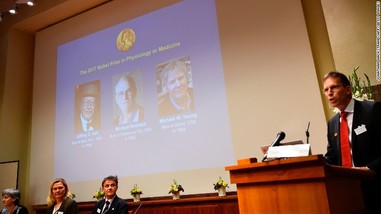 It's Nobel prize announcement week. Today we just were announced the expected Physics one for the gravitational waves, but yesterday, the one on physiology was a well deserved one, also. The Nobel prize in physiology was awarded for their discoveries of molecular mechanisms controlling the circadian rhythm. This circadian rhythms are internal clocks that all living creatures have and that control most of our internal mechanisms such as protein production, gene expression, ... We are ruled by the 24 hours of the sun light, and we have evolved adapted to it. Even though our natural clock works for 25 hours, it seems to be more robust than the 24 hors one, due to interactions with many other circadian clocks. Our body has many different internal clocks that make it work properly. They are all interconnected, so some of them depend on others. Also, because we are being in interaction with other animals, plants, and their clocks, ours have been adapted to the whole system. Understanding these circadian rhythms is tantamount for many reasons. On the one hand, it can help us understand interactions in the complex nature of ecology, but also in social networks. We can see which phenomena (which clocks) are the most relevant ones in interactions to know and forecast the effects of one of the clocks weaken, for example. But on the other hand, it can improve how we administrate medicines to sick people, in order for it to synchronize with the suitable clock to make it reach its destiny in the most efficient manner.
0 Comments
Leave a Reply. |
Andrés AragonesesPhysicist, working in quantum optics and nonlinear dynamics in optical systems. Loves to communicate science. Archives
January 2018
Categories |
 RSS Feed
RSS Feed
